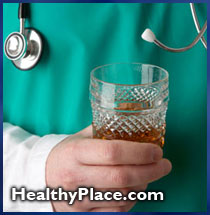Medical Treatment of Alcoholism Online Conference Transcript
![]() Joseph Volpicelli M.D., Ph.D., our guest, pioneered the use of therapy combined with medications to treat alcoholism. In his new book, "Recovery Options:The Complete Guide , Dr. Volpicelli explains all the options to treat alcoholism. (find here the basics of alcohol abuse treatment)
Joseph Volpicelli M.D., Ph.D., our guest, pioneered the use of therapy combined with medications to treat alcoholism. In his new book, "Recovery Options:The Complete Guide , Dr. Volpicelli explains all the options to treat alcoholism. (find here the basics of alcohol abuse treatment)
David Roberts is the HealthyPlace.com moderator.
The people in blue are audience members.
David: Good evening everyone. I'm David Roberts. I'm the moderator for tonight's conference. I want to welcome everyone to HealthyPlace.com.
Our topic tonight is "Medical Treatment of Alcoholism". Our guest is Joseph Volpicelli M.D., Ph.D. Dr. Volpicelli is an Associate Professor of Psychiatry at the University of Pennsylvania and Senior Scientist at the Pennsylvania VA Center for Research on Addictive Disorders.
During the past quarter century, he has pioneered the integration of medications with psychotherapy support to treat addictions. His research on the use of Naltrexone led to the first new medication to be approved by the FDA for alcohol treatment in nearly 50 years. Dr. Volpicelli is also the author of the book: "Recovery Options: The Complete Guide".
Good Evening, Dr. Volpicelli, and welcome to HealthyPlace.com. We appreciate you being our guest tonight. Have we arrived at the point yet where there are medications available that will stop, or greatly reduce, the alcoholic's craving for alcohol? (How much is too much alcohol?)
Dr. Volpicelli: Thanks for the introduction, David, and its a pleasure to be here. To answer your question, I believe that we now have effective medications that can greatly aid in recovery from alcoholism. Medications such as Naltrexone can very effectively reduce the craving for alcohol and reduce the chance of a relapse.
David: What medications are available today to help alcoholics and what do they do?
 Dr. Volpicelli: The two medications that are approved in the United States are Antabuse, a medication that when combined with alcohol can make you feel ill. And in 1994, a new medication was approved by the FDA, Naltrexone. This is a new class of medication, that can actually reduce the desire to drink and the "high" one gets from drinking. People may have heard of several newer medications that are being tested such as Acamprosate (Campral) and Ondansetron. These medications may be helpful for certain types of alcoholics.
Dr. Volpicelli: The two medications that are approved in the United States are Antabuse, a medication that when combined with alcohol can make you feel ill. And in 1994, a new medication was approved by the FDA, Naltrexone. This is a new class of medication, that can actually reduce the desire to drink and the "high" one gets from drinking. People may have heard of several newer medications that are being tested such as Acamprosate (Campral) and Ondansetron. These medications may be helpful for certain types of alcoholics.
David: Is there any conclusive research out yet, that indicates a physiological reason why a particular person becomes addicted to alcohol?
Dr. Volpicelli: There are several studies that clearly point to a genetic basis for why some people become addicted to alcohol. We have conducted studies that show the release of endogenous opioids (endorphins) is higher in people at risk of becoming an alcoholic. Also, some people may be protected from abusing alcohol because they are very sensitive to the sedative effects of alcohol. They fall asleep before they experience the alcohol "high".
David: What, would you say is the most effective long-term treatment for alcohol addiction?
Dr. Volpicelli: I believe that alcoholism is a biopsychosocial disorder and the best long-term approach to treatment is to combine a biopsychosocial approach. This includes the use of medications such as Naltrexone, and also psychosocial support to help people learn to cope with life without alcohol. Often people have damaged their social relationships from their alcohol addiction, so recovery includes reconnecting with family and friends. For some people, support groups like Alcoholics Anonymous (AA) are helpful, especially in reducing the shame associated with having an alcohol problem. In general, the best approach is individualized to meet the needs of the patient.
David: The relapse rates among alcoholics are very high. Some 50% relapse within three months of starting treatment and 75% within the first year. Can we say that therapy alone, whether it be a 12-step program like Alcoholics Anonymous (AA) or a residential treatment program or individual therapy just isn't that effective for most alcoholics?
Dr. Volpicelli: I would say the glass is half full. Psychosocial treatments are effective for some people, and even among people who relapse, one can often get them back into treatment. Of course, if we can combine medications and reduce the relapse rates further, as appears to be the case, then it is wise to use every available tool to aid in recovery from alcoholism.
David: Here are some audience questions, Dr. Volpicelli:
mwolff: What are the major side-effects of Naltrexone?
Dr. Volpicelli: Most people taking Naltrexone do not report significant side-effects. However, when side-effects are reported, they are often mild and disappear in a few days. These side-effects include nausea in about 10% of people, and for some, tiredness, headaches, or irritability. We can often manage the side-effects by giving Naltrexone at night or with food. On those rare occasions when side-effects persist, Pepto-Bismol can help.
jeffgrzy: How can medication get rid of a craving for alcohol, when cravings are beyond the physical, such as selfishness, resentments, fears, and ego?
Dr. Volpicelli: There are now several studies that show how emotions can affect brain chemistry. So for example, feelings such as anger or fear, cause biochemical changes in the brain and can increase the craving for alcohol. The use of medications can help block craving for alcohol caused by unpleasant moods or even reminder cues for using alcohol.
aurora23: How do you know if you are an alcoholic or just a social drinker?
Dr. Volpicelli: The best way to decide is to ask yourself: how well can you control your drinking once you start? For alcoholics, it is said in Alcoholics Anonymous (AA) that one drink is too many and 100 drinks not enough. This points out that for the alcoholic, one drink increases the desire to have the next drink creating a vicious cycle of alcohol addiction. This addictive cycle typically leads to problems with physical, psychological, or social health. The social drinker, on the other hand, is able to limit their drinking once they start.
|
|
David: One of the other medications I've seen mentioned recently is Ondansetron, an anti-nausea drug used for cancer patients. Is that similar to the effects of Antabuse?
Dr. Volpicelli: Ondansetron is a medication that blocks certain serotonin receptors. It appears to be helpful in a group of alcoholics who have an early onset of alcoholism, like those under twenty-five years of age. It may be that for certain types of alcoholics, medications such as Ondansetron can help reduce the desire to drink and the amount of drinking that occurs once a drinking episode begins. It does not work like Antabuse by making you sick. Rather, we are still trying to learn how it may work.
Spiced: What distinguishes the reaction of an alcoholic's brain to alcohol from that of a non-alcoholic's?
Dr. Volpicelli: The excitement or high that one obtains from alcohol, often differentiates alcoholics from social drinkers. I have had some patients tell me, that the first time they drank, they experienced a wonderful euphoria, unlike anything they had experienced before. This pleasure seems to be related to changes in brain neurotransmitters such as endorphins or dopamine that cause the "high" from alcohol. There may be a day, when we can predict who is likely to abuse alcohol, based on the brain's response to alcohol.
ammat: How do you reassure a prospective patient that treating one addiction with a drug won't lead to another addiction (e.g. taking pills)?
Dr. Volpicelli: Excellent question. Many people fear that medications such as Naltrexone are a crutch, or worse yet, can lead to addiction themselves. However, naltrexone is not addictive, and does not have psychoactive effects on its own, rather it blocks the psychoactive effects of other drugs.
As we learn more about the brain chemistry of addiction, we will find that alcoholism is not that different from other chronic medical disorders, such as diabetes or hypertension. While we can often control these other chronic diseases with diet and exercise, for some people, medications offer the best hope for treatment and to avoid future complications. That is why it is fortunate that medications are now an option for the treatment of alcoholism.
Manyhats: Would Naltrexone help someone who wants to moderate their drinking?
Dr. Volpicelli: Naltrexone has been suggested by some people as a way to moderate drinking. My own bias is that Naltrexone, while it can limit drinking episodes to just a few drinks, is best used with a program that promotes abstinence. Having said this, I do have some patients who choose to have a drink now and again, and find that Naltrexone is an excellent aid in limiting their drinking.
ALL4UBABY: Do you think that it doesn't matter what medication you take to get rid of the main problem? Will this lead to cause another problem? Is this true, and if so, what is the point in taking medication?
Dr. Volpicelli: I have treated hundreds of patients with Naltrexone, or other medications, as part of a whole biopsychosocial approach to treatment. Naltrexone does not make all of one's life's problems to go away. Rather it is a tool to help people remain sober and to help people not experience the intense craving for alcohol, so that they can learn to cope with issues that may have contributed to their drinking.
For example, several patients have told me that without Naltrexone, they had to "white knuckle" their first several months of sobriety and all they could concentrate on was not drinking. On Naltrexone, they felt less obsessive desire to drink and could focus on the main issues.
David: Correct me if I'm wrong Dr. Volpicielli, but what you are saying is: the medications help control the physical craving for alcohol, but that doesn't mean the psychological issues have gone away. And for that, you need therapy.
Dr. Volpicelli: That is exactly right, David. No medication can solve your problems with your spouse or boss. However, drinking alcohol certainly does not help one solve any problems. So, if you can control the drinking, then you have a much better chance to cope with psychological issues.
Spiced: Can you enlighten us briefly, on what is behind a craving for alcohol?
Dr. Volpicelli: There are several theories, but one biological theory is that when you think of alcohol, or see something that reminds you of drinking alcohol, the brain releases chemicals that "prime" the body for alcohol. These chemicals stimulate the desire to drink and can be associated with real physiological changes such as salvation. It is like an itch that needs to be scratched. Now if one can distract oneself long enough, the craving may go away. But for some people, the craving for alcohol is so strong that they decide they need a drink to reduce the craving.
mwolff: My biggest problem without alcohol is insomnia!! Any suggestions?
Dr. Volpicelli: Yes, often insomnia is present in the early stages of recovery from alcoholism, as the body adjusts to not having alcohol. For people with chronic insomnia, there are behavioral strategies such as getting into a daily routine of going to bed. For some people, the use of medications such as Trazodone may help initiate sleep.
David: Are any of the medications we've talked about tonight effective for binge drinkers? (What is binge drinking and binge drinking stats here.)
Dr. Volpicelli: There have been a couple of studies that show that Naltrexone is effective for binge drinkers. Naltrexone reduces the binge from over five drinks per drinking episode, to just a couple of drinks. Also, newer medications such as the SSRI's may help reduce the number of binges, but more research is needed.
David: Besides the medications, are there any medical techniques that reduce the desire to drink or is therapy the only thing left?
Dr. Volpicelli: At Penn, we have developed new behavioral treatments to help alcoholics stay in treatment longer, and adhere to taking their medications. We call this new approach the BRENDA approach because it stands for:
- Conducting a thorough Biopsychosocial evaluation
- Giving people a Report of how their drinking is causing problems
- Using Empathy to help people feel understood by the therapist
- Understanding the person's Need for wanting to recover
- Offering Direct advice
- Followed by Assessing the response to direct advice
We finish that, by maintaining a non-confrontational, non-judgmental approach to treatment and giving people options. Most people will stay in treatment and recover. With the BRENDA approach and the use of medications, we have observed about an 80% success rate in helping people recover.
David: You can purchase Dr. Joseph Volpicelli's book: "Recovery Options: The Complete Guide" by clicking here.
Thank you, Dr. Volpicelli, for coming tonight and sharing this information with us. We appreciate it. And thank you to the audience for coming and participating. I hope you found it helpful.
Dr. Volpicelli: Thank you for inviting me.
David: Good night everyone.
Disclaimer: We are not recommending or endorsing any of the suggestions of our guest. In fact, we strongly encourage you to talk over any therapies, remedies or suggestions with your doctor BEFORE you implement them or make any changes in your treatment.
|
|
back to: Addictions Conference Transcripts
~ Other Conferences Index
~ all addictions articles
APA Reference
Gluck, S.
(2007, August 1). Medical Treatment of Alcoholism Online Conference Transcript, HealthyPlace. Retrieved
on 2026, January 14 from https://www.healthyplace.com/addictions/transcripts/medical-treatment-of-alcoholism-online-conference-transcript


